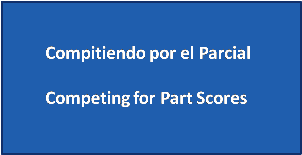2. Your actual opponents (players sitting the same direction) are often not permitting it.
3. Your loss will likely be less than 110 or 140.
4. You may miss the opportunity to push them high enough to get a positive score.
2. Double.
3. Bid 2 NT.
12-15 opposite 7
12-15 opposite 8
12-15 opposite 9
12-15 opposite 6-9 Responder will “never” have 10. c.f.
-Bid to the 3 level
-Pass and let you play
In general, if they have a fit, YOU have a fit. They found theirs, find yours!
2NT = both minors and fewer than 4 Spades
2S/3C/D = a 5-card suit (to an honor?).
| Double | Double or Bid 2NT |
Pass? 2 NT? | Bid 2 NT(!) |
What is going on with hands C & D? Answer: Where are the points? Opener has less than 16, Responder has less than 10 so 24 (15 + 9) is their combined maximum total; Partner has 16(+) in D. How could Partner pass with 16+ points? Because she TRUSTS you! (to reopen). Don’t let her down.
Reopen in the Pass-out seat unless you have a reasonable chance of setting the contract.
B. REOPENING IF THE CONTRACT IS 2 SPADES.
The theory and reasoning are the same, the bids similar.If the Opponents are bidding Spades, in the pass-out seat:
Dbl. = 4 Hearts and a tolerance for both Minors
2NT = Both Minors and fewer than 4 Hearts
3C/D/H = a 5-card suit (to an honor?).
| Double | Bid 2NT |
Pass | Bid 2 NT(!) |
What is going on with hands C & D? Answer: Same as above D. WHAT HAPPENS IF I PUSH?
Here are some possible consequences of your aggressive “pushiness”:
| Your Side | PLUS | MINUS |
| a) If you let them play at the two-level | 110, 140 or 170 | |
| b) If you bid at the 2 or 3 level and make it | 110 | |
| c) If you bid at the 3 level and go down | 50 or 100 | |
| d) If THEY bid to the three level and go down | 50 or 100 | |
| e) If they bid 3 and make it | 140 | |
| f) If they double you at 3 level | 100, 200, 500 | |
Most of the time, it is right to not let them play a contract at the 2 level and bid and make their contract.
-You will be AHEAD 60% of the time (b, c and d).
-You will BREAK EVEN 20% of the time: (e)
-You will SUFFER 20% of the time (f). This is the least likely result; most of the time you will not be doubled. Keep in mind that at Pairs (match points) it is about how often not how much.
E. WHEN IS IT NOT APPROPRIATE TO BALANCE?-When they do not have a trump fit.
| West | North | East | South |
| 1 |
Pass | 1NT | Pass |
| 2 |
Pass | 2 |
Pass |
| Pass | ? | ||
-When they are in their third suit:
| West | North | East | South |
| 1 |
Pass | 1 |
Pass |
| 1 |
Pass | 2 |
Pass |
| Pass | ? | ||
BTW, what do you lead against this type of bidding?
F. HERE ARE 2 PRACTICE HANDS. WEST IS THE DEALER IN BOTH CASES.
1.
| West | North | East | South |
| 1 |
Pass | 1 |
Pass |
| 2 |
Pass | Pass | 2 |
| ? | |||
2.
| West | North | East | South |
| Pass | 1 |
Pass | 2 |
| Pass | Pass | 2NT | 3 |
| The End | |||
G. PRE-BALANCING; A NEWER CONCEPT
-Only applies after 1-P- raise to 2.
-Bid directly over Responder with a hand you would balance with if you were in the pass-out seat.
-You will make aggressive overcalls in this seat.
-Partner must not get excited, i.e., over bid.
-Bid at the 2 level on almost any decent 5-card suit (unless you have good reason not to)*.
-If you have a better hand, you should bid almost any 5-card suit.
-Particularly if you are short in a higher suit and do not want Partner to balance in that suit.
-Be aggressive in this fourth seat when Responder makes a non-forcing bid.
-Caution! Opener has not limited his hand.
* Can reasonably expect to set the contract.
With: ![]() 43
43 ![]() AJT87
AJT87 ![]() KJ42
KJ42 ![]() 32:
32:
After 1![]() -P-2
-P-2![]() , bid 2
, bid 2![]() if not Vul. You do not want partner to bid 2
if not Vul. You do not want partner to bid 2![]() or pass.
or pass.
With: ![]() x
x ![]() AK642
AK642 ![]() A842
A842 ![]() 963, pre-balance with 2
963, pre-balance with 2![]() at any Vul.
at any Vul.


